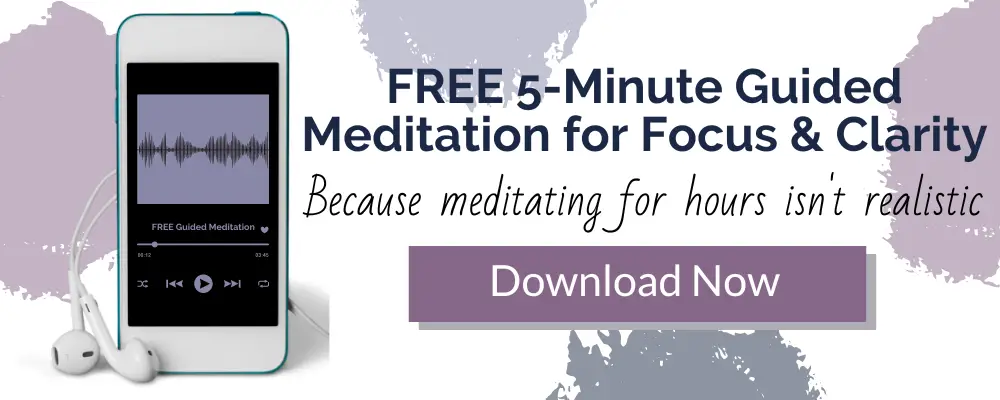What Do Meditation and Hypnosis Have in Common?

On the surface, the practices of meditation and hypnosis may seem very different from each other. Meditation is often thought of as a spiritual or mindfulness practice, while when you think of hypnosis stage shows or therapy sessions come to mind. But, when you take a closer look, there are some key similarities between these practices.
What do meditation and hypnosis have in common? Meditation and hypnosis are two practices that have been around for centuries and have been used and shown to be effective tools to help people reduce stress, improving sleep, and overcome fears and phobias. At their core, both hypnosis and meditation involve entering a state of deep relaxation and focus, allowing the mind to become more receptive to positive suggestions and changes.
Think of it like a radio station – when your mind is cluttered with thoughts and distractions, it’s like tuning into a station with a lot of static. But when you meditate or enter a hypnotic state, it’s like tuning into a clear and focused station that allows you to receive the messages and suggestions that can help you achieve your goals.
In this article, we’ll explore the similarities between hypnosis and meditation in more detail, and how you can use both practices to achieve your own personal goals. Whether you’re looking to reduce stress, improve your sleep, or overcome fears and phobias, understanding the similarities and differences between these two powerful practices can help you unlock your full potential.
How are Meditation and Hypnosis Different
Hypnosis and meditation have a lot in common, but they are also key differences. Their focus may be the most important difference. Meditation is usually about being present and aware of yourself, while hypnosis is about suggestions and changing behavior. This means that, depending on your goals and needs, the techniques and strategies used in each practice may be very different. But despite these differences, both of these practices can be very powerful ways to improve your mental and emotional health.

Focus of Meditation
The focus of meditation is often on mindfulness and self-awareness. This means that during meditation, you are encouraged to observe your thoughts and feelings without judgment. The goal is to become more present in the moment and gain a deeper understanding of your inner thoughts and emotions.
There are many different types of meditation, but most involve some form of mindfulness. Some people may use meditation to manage stress and anxiety, while others may use it to improve their focus or achieve a deeper sense of peace and tranquility. At the end of the day meditation is all about cultivating a greater sense of self-awareness and living more mindfully in the present moment.
Focus of Hypnosis
The focus of hypnosis is typically on suggestibility and behavior change. During a hypnosis session, a hypnotist may use guided imagery and relaxation techniques to help you get into a trance-like state where you are more suggestible and open to new ideas.
The goal is to change your subconscious mind in order to create positive changes in your life. Hypnosis can help with a wide range of issues, from getting over phobias and anxiety to improving self-esteem and breaking negative habits. Some people might be afraid to try hypnosis because they’ve seen it in stage shows or movies, but hypnotherapy whether done by a trained professional or using guided self-hypnosis can be a safe and effective tool. The ultimate goal of hypnosis is to help you tap into your inner resources and make positive changes in your life.
Even though hypnosis and meditation are different in some ways, there is no one “right” way to do either one. Find the method that works best for you, whether you want to improve your self-awareness and mindfulness through meditation or change bad habits through hypnosis. By trying both practices and trying out different exercises, you’ll be able to get a better understanding of yourself, feel less stressed and anxious, and reach your goals with more clarity and focus. So don’t be afraid to try both and see how they can help you.
What Do Meditation and Hypnosis Have in Common
Hypnosis and Meditation have some striking similarities. Both good ways to improve your mental and emotional health. Both teach you to be mindful in the present moment and watch your thoughts without judging them. This can help you learn more about your feelings and thoughts. Both practices also focus on deep relaxation and can lead to a different state of mind that can be therapeutic and life changing.

Mindfulness
Mindfulness is an important part of both meditation and hypnosis. It means being present and aware of your thoughts, feelings, and surroundings, without judging them or getting caught up in them.
By practicing mindfulness, you can develop a deeper understanding of your thoughts and gain greater self-awareness. Mindfulness also helps you to stay calm and centered, which can be incredibly helpful for reducing stress and anxiety. Mindfulness has also been shown to help you to become more focused and productive in your daily life, as you learn to stay present and engaged in each moment.
Deep Relaxation
Deep relaxation is a key part of both hypnosis and meditation. When you practice these techniques, you are encouraged to let go of any tension or stress in your body. This relaxation can be incredibly beneficial for reducing stress and anxiety, which can have a positive impact on both your physical and mental health.
During meditation, you can calm your mind and body by focusing on your breath or on a specific object. During hypnosis, you might be led into a calm and peaceful state of hypnosis. By regularly taking time to unwind, you can learn to let go of stress and tension and feel more calm and peaceful every day. This can help you be more productive, stay on task, and enjoy the moment you’re in.
Altered State of Consciousness
Hypnosis and Meditation have something in common: they both change your state of mind. During these practices, you may find yourself in a different state of mind than when you are awake. For example, when you meditate, you might get into a meditative state where you feel more connected to yourself and the world around you. During hypnosis, you may go into a hypnotic trance in which you are more open to new ideas and more easily influenced.
These altered states of consciousness can be therapeutic and transformative, as they allow you to access different parts of your mind and gain deeper insights into your thoughts and emotions. By practicing both meditation and hypnosis, you can learn to enter these states more easily, which can help you to achieve your goals and improve your mental and emotional well-being.
While there are certainly differences between meditation and hypnosis, the similarities between these two practices are perhaps even more significant. Both place a strong emphasis on mindfulness, relaxation, and altered states of consciousness, which can help you improve your mental and emotional well-being in a variety of ways. By practicing both, you may be able to achieve a deeper level of self-awareness, reduce stress and anxiety, and achieve your goals with greater focus and clarity. So why not give both practices a try and see what benefits they can bring to your life?
Benefits of Hypnosis and Meditation
Both hypnosis and meditation are powerful tools for improving your mental and emotional well-being. These practices have been shown to have a wide range of benefits, from reducing stress and anxiety to improving your mood and focus. While the specific benefits of each practice may differ depending on your goals and needs, there is no doubt that both can be incredibly transformative. So whether you’re looking to cultivate mindfulness, reduce stress, or achieve your goals, these practices may be just what you need to take your mental and emotional health to the next level.
Improved Mood
Both hypnosis and meditation have been shown to improve your mood. Meditation can help with depression and anxiety because it helps you become more aware of your thoughts and feelings and gives you a calmer sense of who you are. Hypnosis can also help improve your mood because it can help you get rid of negative thoughts and actions that might be making you feel bad.
By using these techniques on a regular basis, you can learn to deal with your feelings better and feel happier and more at ease. This can improve your relationships, your work, and your quality of life as a whole. If you’re struggling with mood issues, adding meditation or hypnosis to your daily routine may help you feel better.
Reduced Stress
Hypnosis and meditation are both very effective ways to deal with stress. By using these techniques on a regular basis, you can learn to be more aware of your stress levels and come up with better ways to deal with it. You can calm your mind and body using mindfulness meditation techniques. This can help you feel less stressed and overwhelmed.
During hypnosis, you might be led into a calm and peaceful state of relaxation. This can help your body and mind let go of stress and tension. Meditation and hypnosis can help you become less stressed and better able to deal with the challenges of everyday life over time. If you’re feeling stressed or overworked, adding these things to your daily routine might help you feel better.
Increased Focus
Hypnosis and meditation are also good ways to heighten your concentration. By using these techniques on a regular basis, you can learn to be more in the moment and improve your ability to maintain focused attention. During meditation, you might focus on your breath or on a certain object to help you keep your mind clear and calm. This can help you stay on task and avoid getting sidetracked.
During hypnosis, you might think about goals you want to reach or habits you want to change. This can help you stay on track with your goals and keep you motivated. Meditation and hypnosis can help you become more clear-headed and focused over time. This can be very helpful for your work, your relationships, and your overall quality of life. If you want to improve your ability to concentrate or get things done, adding these habits to your daily routine may help you reach your goals.
The benefits of both methods are clear. Whether you’re looking to improve your mood, reduce stress, or increase your focus, these practices can be incredibly powerful tools for achieving your goals. By cultivating mindfulness, deep relaxation, and an altered state of consciousness, you may be able to gain a deeper understanding of your inner world and make positive changes in your life.
Try Them For Yourself
What do meditation and hypnosis have in common? Even though hypnosis and meditation may seem to be very different, they have a lot in common. Both practices are about being aware, relaxing, and changing your state of mind. The main difference is that meditation focuses on being present and aware of yourself, while hypnosis focuses on suggestions and changing behavior. Both practices can improve your mood, lower your stress, and help you pay more attention.
So why not give both a try and see what benefits they can bring to your life? With a little practice and persistence, you may be surprised at how much these practices can transform your mental state and emotional well-being.













